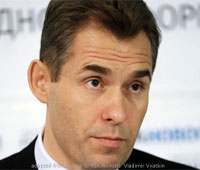Interfax: Astakhov Criticizes Western Juvenile Justice, Nontraditional Families

MOSCOW. Nov 19 (Interfax) – The Western form of juvenile justice will not work in Russia, Russian children’s rights commissioner Pavel Astakhov said.
“My principled stance is that the Western style, a virtually bankrupt form of juvenile justice is not viable,” Astakhov told reporters on Tuesday.
“It is not viable in Russia because the equality between parents and a child exists, everyone is equal under the law and in the court,” the commissioner said.
Protecting the traditional family is an issue of Russia’s security, Astakhov said.
“The main front for our country now is the fight for the traditional family, this is the target of the main strike and our children are most vulnerable in this sphere. What will happen to our children and in return to our country depends on us,” Astakhov said at the Holiness of Motherhood forum.
“The notion of the family – as any union, of any citizens, of any gender and soon it will be of any number as well – is changing today,” the commissioner said.
The notions of mother and father are becoming lost in Europe, though this contradicts the UN convention saying that a child has the right to a mother and father, Astakhov said.
“Politicians and state officials, who support the destruction of [traditional] family, should be pariahs, should be cursed in centuries to come as destroyers of the family and the human race. The so-called freedom of relations does not give the pitiful minority the right to destroy humanity, to rewrite history and to throw our children into chaos,” Astakhov said.
Meanwhile, Head of the Russian Federal Service for Supervision in the Sphere of Telecom, Information and Mass Communications (Roskomnadzor) Alexander Zharov said at the forum that on November 25 the concept on children’s information safety, developed by the agency together with experts, would be submitted for public discussion.
“Our goal is to develop a set of measures to implement this concept at the state level. It concerns almost all branches of the authorities and it contains recommendations for all executive agencies involved in information circulation,” Zharov said.
Roskomnadzor monitors over 5,000 mass media outlets daily, detecting several dozen violations of the law on protecting children from harmful information, the official said.
